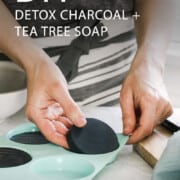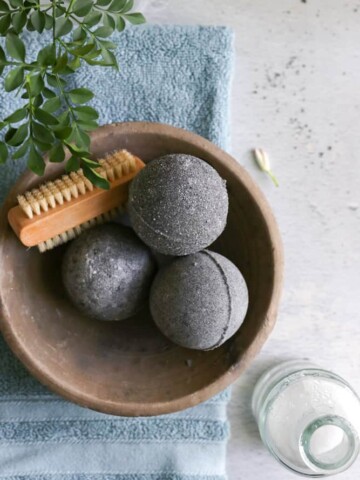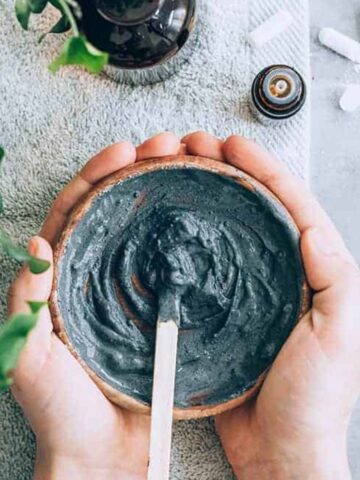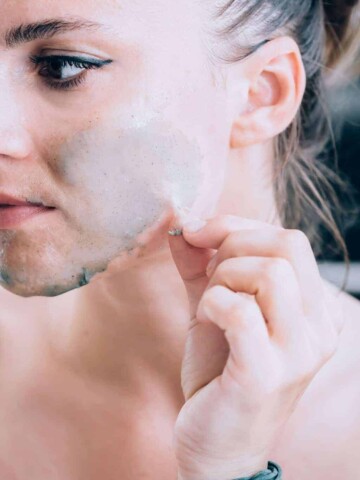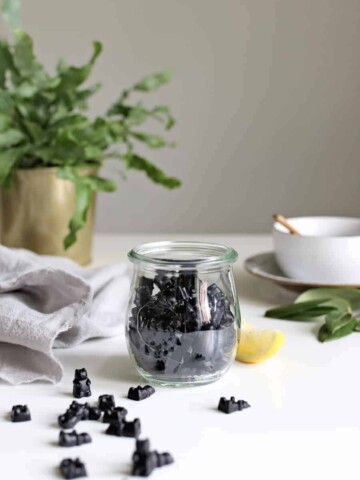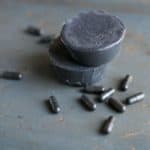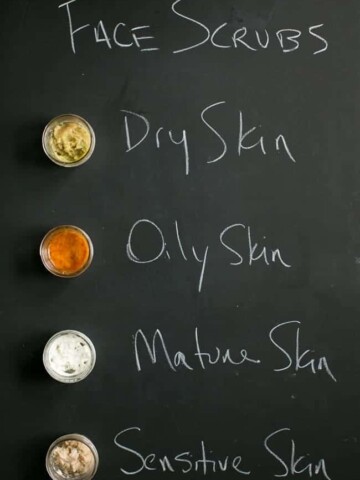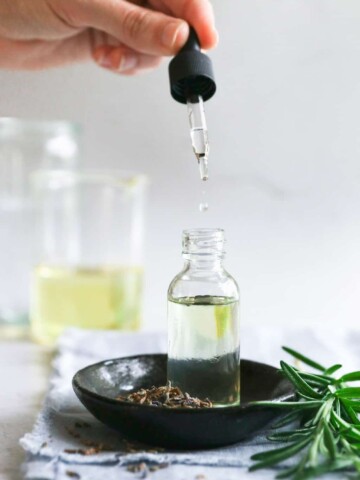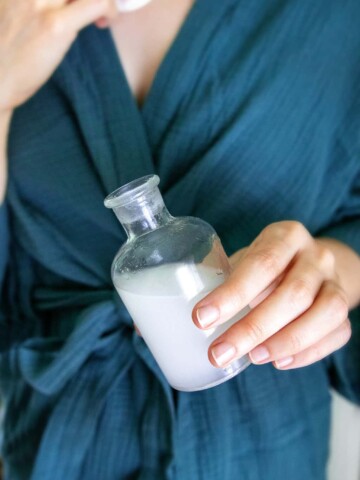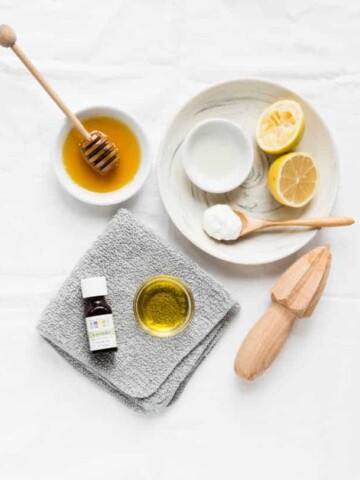Making activated charcoal soap at home is surprisingly easy to do! With its deep cleansing properties and unique appearance, activated charcoal is the perfect natural ingredient to help you achieve a clearer, brighter complexion.
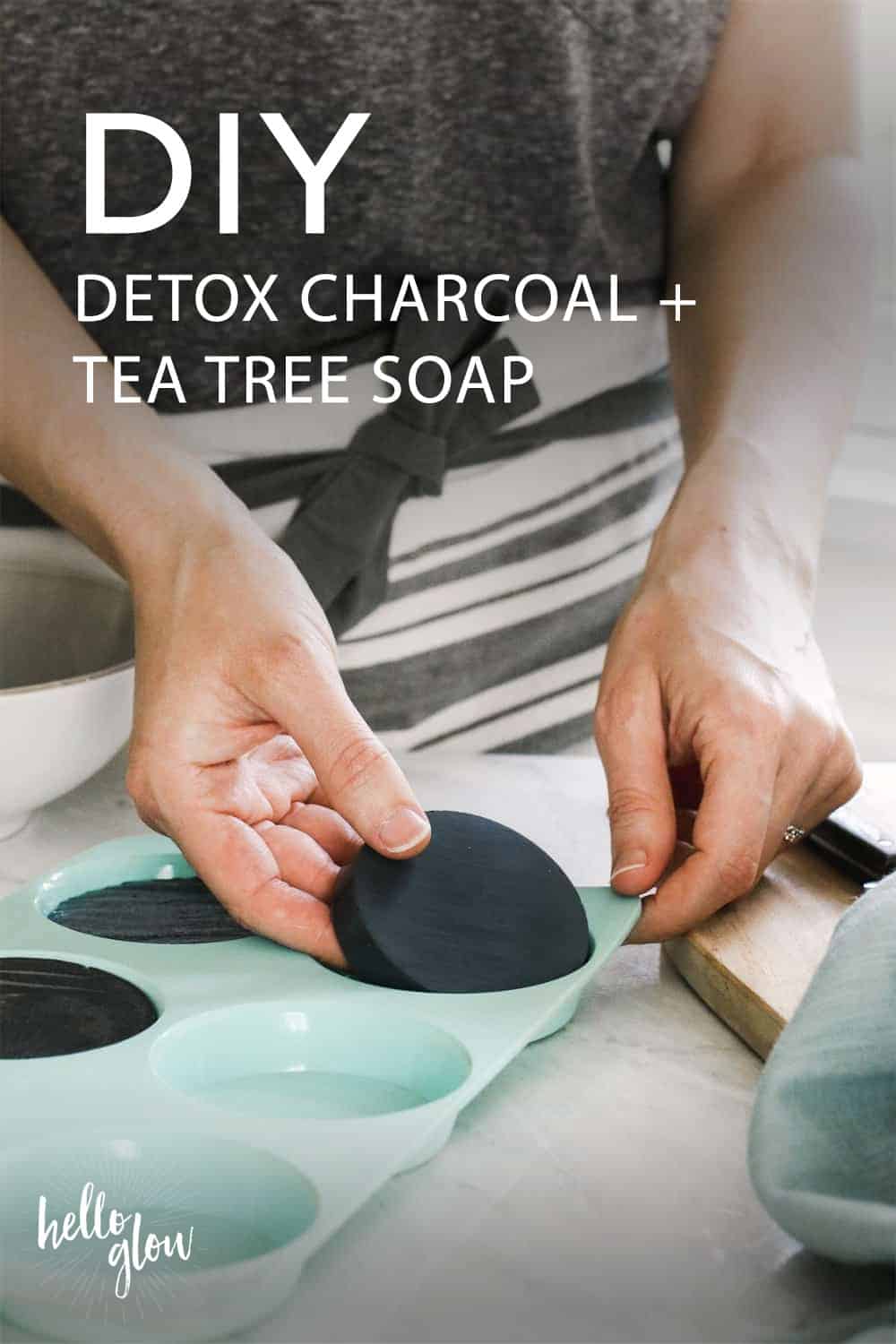
I’ll admit I was skeptical about activated charcoal soap at first. This gal loves her body wash and foaming hand soap. But now I’m hooked. I have become a total convert to the simple bar of soap (makes sense why it’s been around so long)!
As a kid, my dad pulled out activated charcoal all the time for everything from bee stings to upset stomachs. When used in soap, charcoal is detoxifying, exfoliating, clarifying, and just plain ol’ feels good—all without drying out the skin (I use it head to toe, face included).
Plus, melt-and-pour soap is embarrassingly easy to make (which is why I love it), so scroll down for an easy, detoxifying activated charcoal soap recipe.
Jump to:
What Is Activated Charcoal?
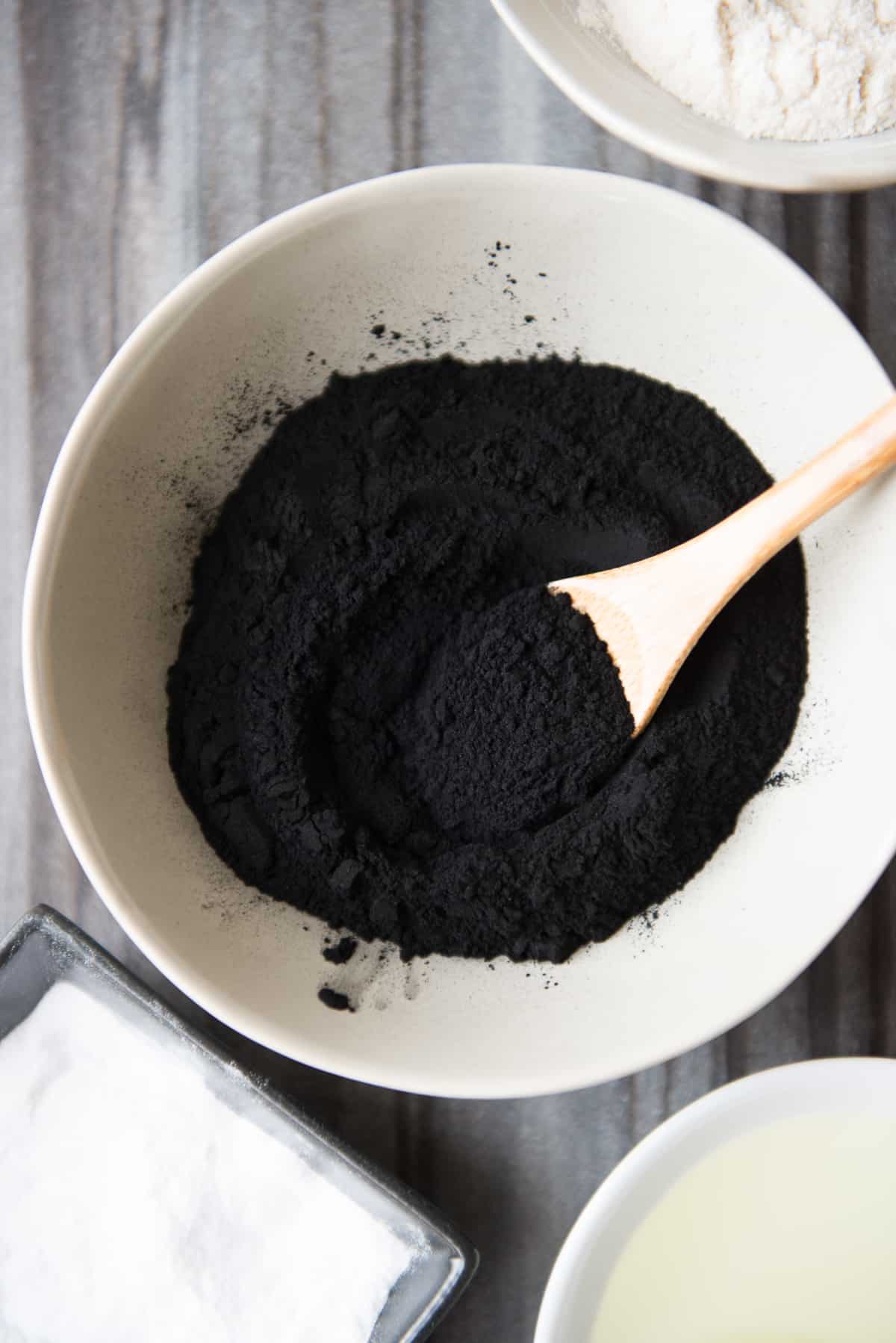
Activated charcoal is an odorless, black powder that has impressive absorptive properties. You've probably heard of charcoal as a natural remedy to relieve bloating and gas.
Don't worry—it's not the same kind of charcoal that you would find in a chimney or on burnt pieces of food. It's 100% food grade and perfectly safe for use in bath and body products like these charcoal soaps.
To get technical: Activated charcoal is made by heating organic materials like wood, coconut shells, or sawdust to high temperatures, which removes all the oxygen and leaves behind carbon. This carbon is then treated with oxygen again, creating the porous structure that makes activated charcoal so effective at absorbing toxins and impurities.
Thanks to its impressive ability to remove impurities beauty companies are turning to activated charcoal more and more as a key beauty ingredient in masks, cleansers, and even toothpaste!
Benefits of Activated Charcoal Soap
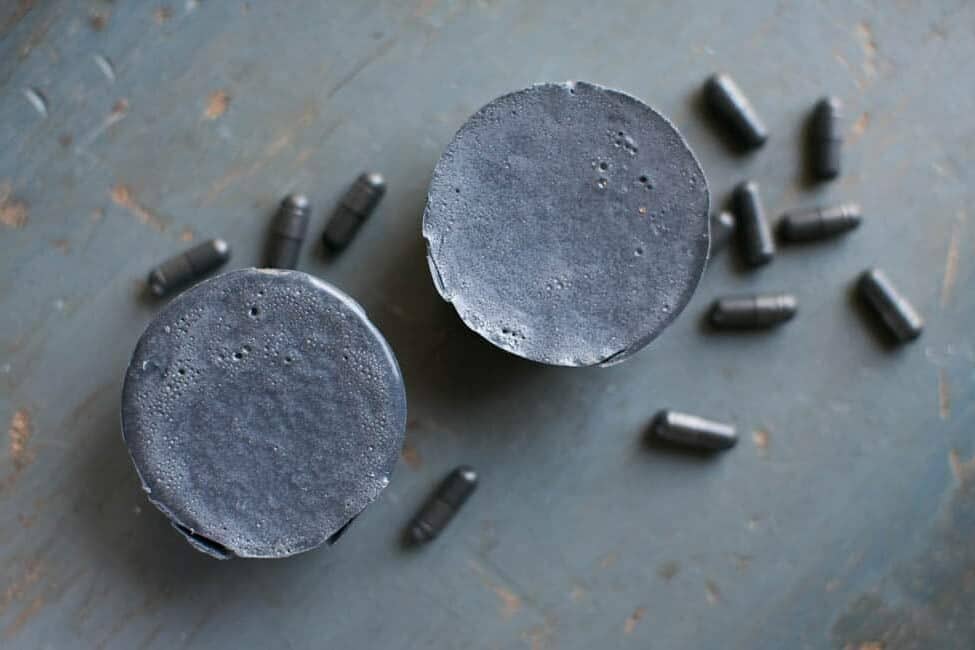
Adding activated charcoal to a homemade cleanser is a simple way to achieve that happy glow we all crave. People with acne and dry skin swear by activated charcoal soap because:
1. It's great for sensitive skin.
Why depend on chemicals to leave your skin looking its finest when you can use something found in nature? Activated charcoal not only works, but it also won’t cause adverse reactions—or lead to pesky breakouts due to chemical reactions.
For those with sensitive skin, charcoal soap can be a gentler alternative to harsher soaps and acne treatments. Just avoid using it too frequently, as it can be drying.
2. It’s antibacterial.
Activated charcoal has some pretty impressive antibacterial properties. One study even found that it can destroy E.coli [source].
Adding tea tree oil to charcoal soap adds natural anti-fungal and antiseptic properties [source].
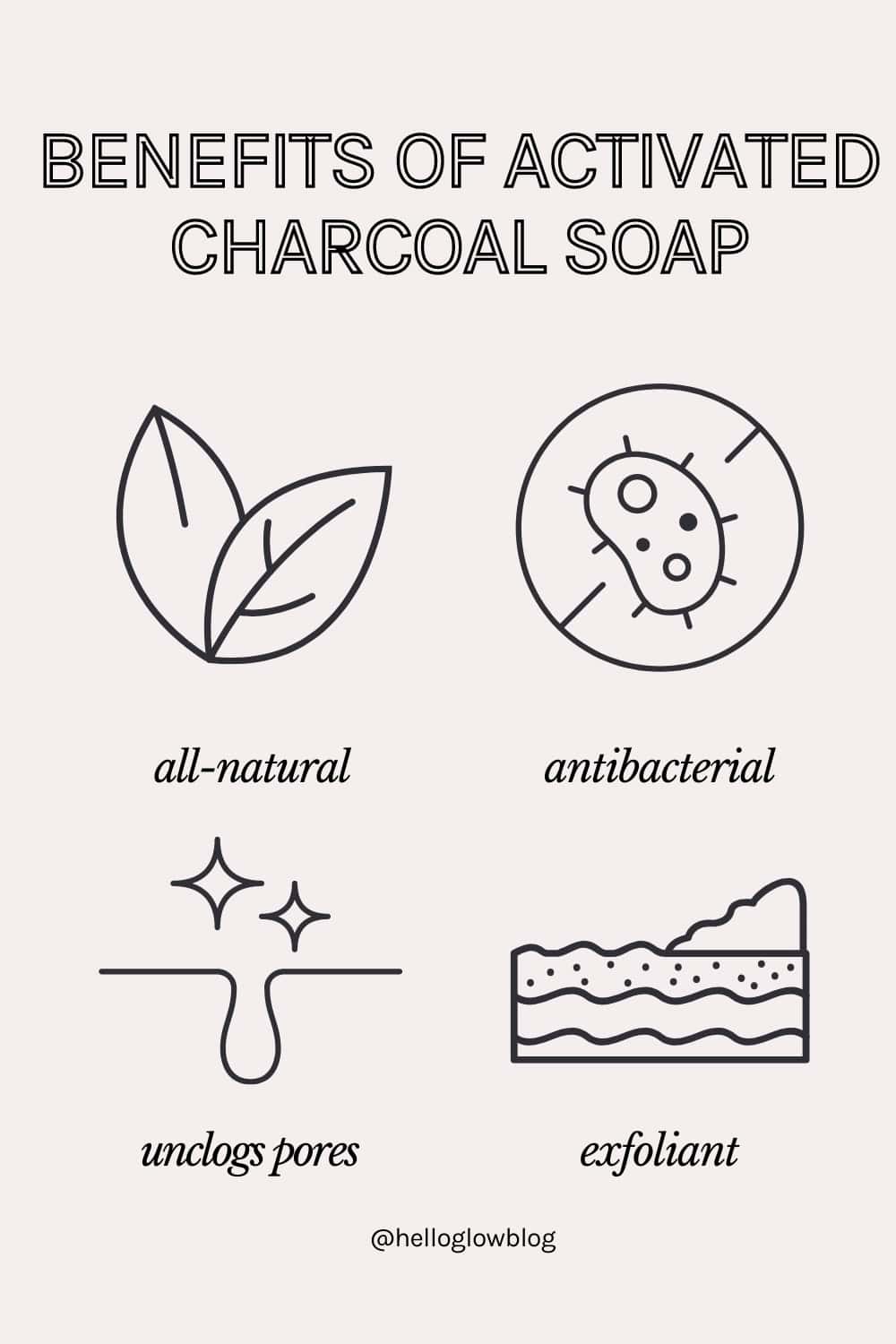
3. It absorbs excess oil
Charcoal is known for its ability to absorb excess oil and remove toxins, making it an excellent choice for those with oily skin.
4. It unclogs pores.
Even with the chemical-laden, store-bought stuff, it’s hard to unclog the pores on your face (and your face contains a whopping 20,000+ of them).
But activated charcoal does a pretty impressive job. It visibly reduces pore size, thanks to its ability to clean out the dirt, oil, and makeup inside each one.
5. It exfoliates.
The texture of activated charcoal makes it a great, all-natural exfoliator. It helps slough off dead skin cells to reveal brighter, smoother, glow-ier, and more youthful-looking skin underneath!
Ingredients
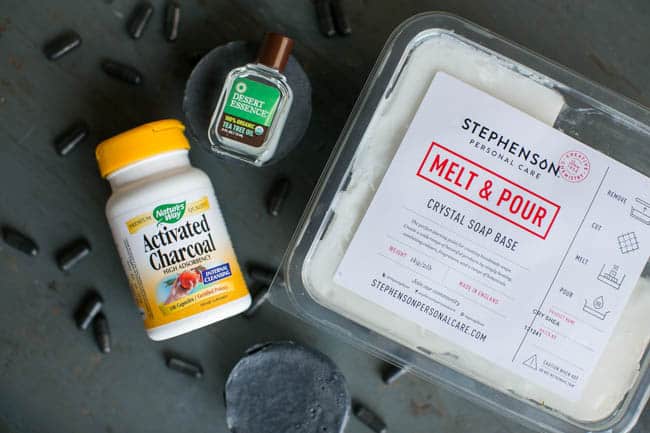
- Shea butter soap base: Shea butter, like Greek yogurt, helps diminish the appearance of fine lines and wrinkles, treats acne and blemishes, cuts down on skin inflammation, and more [source].
- Activated charcoal capsules: I used approximately 4 grams of activated charcoal (or 1 teaspoon) for every ½ pound of soap base. But you can tweak that ratio slightly without hurting the recipe. If you can't find capsules at a pharmacy, you can buy them online or use food grade charcoal powder.
- Tea tree essential oil: This essential oil has natural anti-fungal and antiseptic properties, making the soap essential for acne-prone skin.
See recipe card for exact quantities.
Instructions
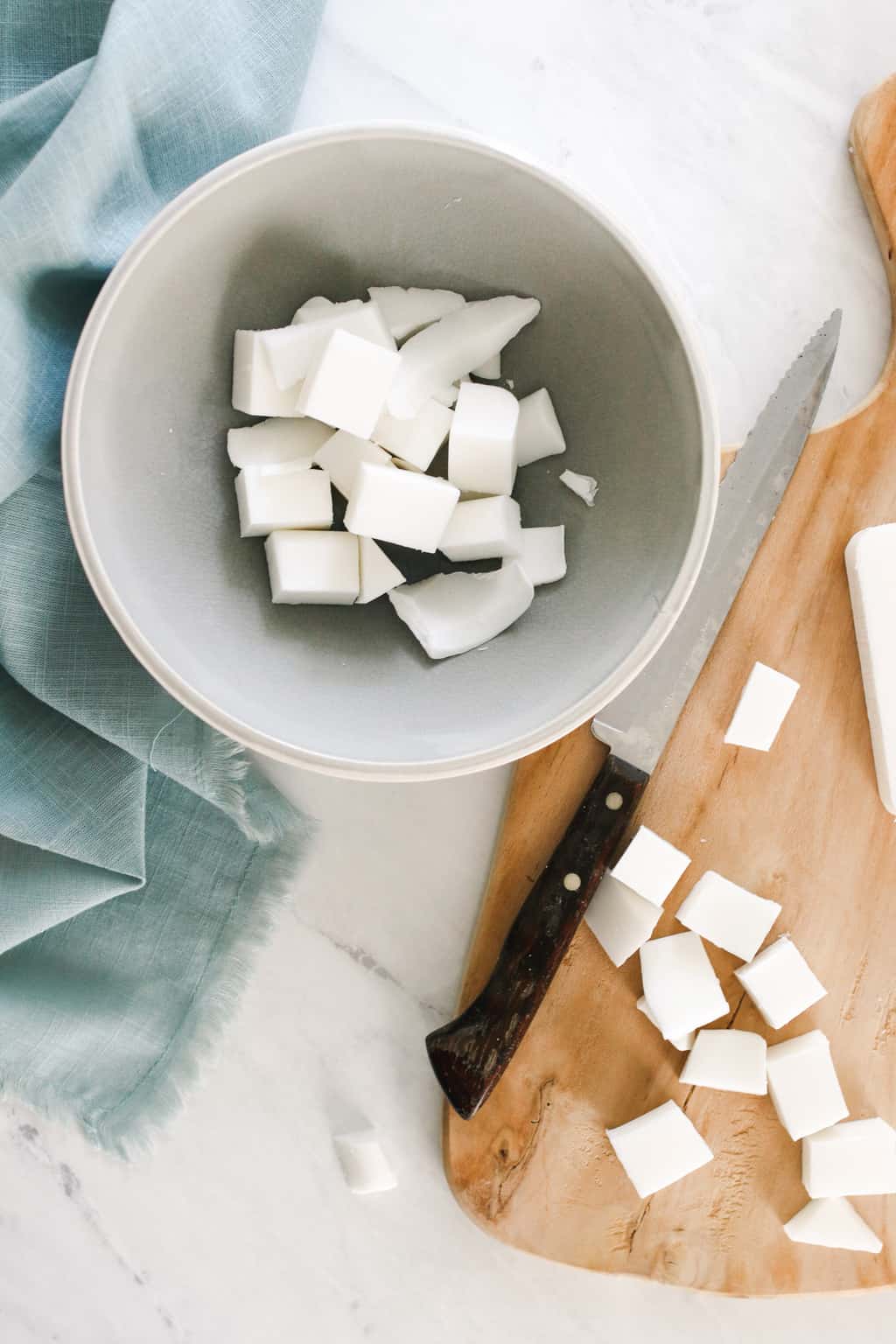
Step 1: Melt soap
Cut the soap base into small chunks and place in a microwave-safe bowl. Heat in 30-second intervals until completely melted. (You can also use a double boiler to melt the soap if you prefer.)
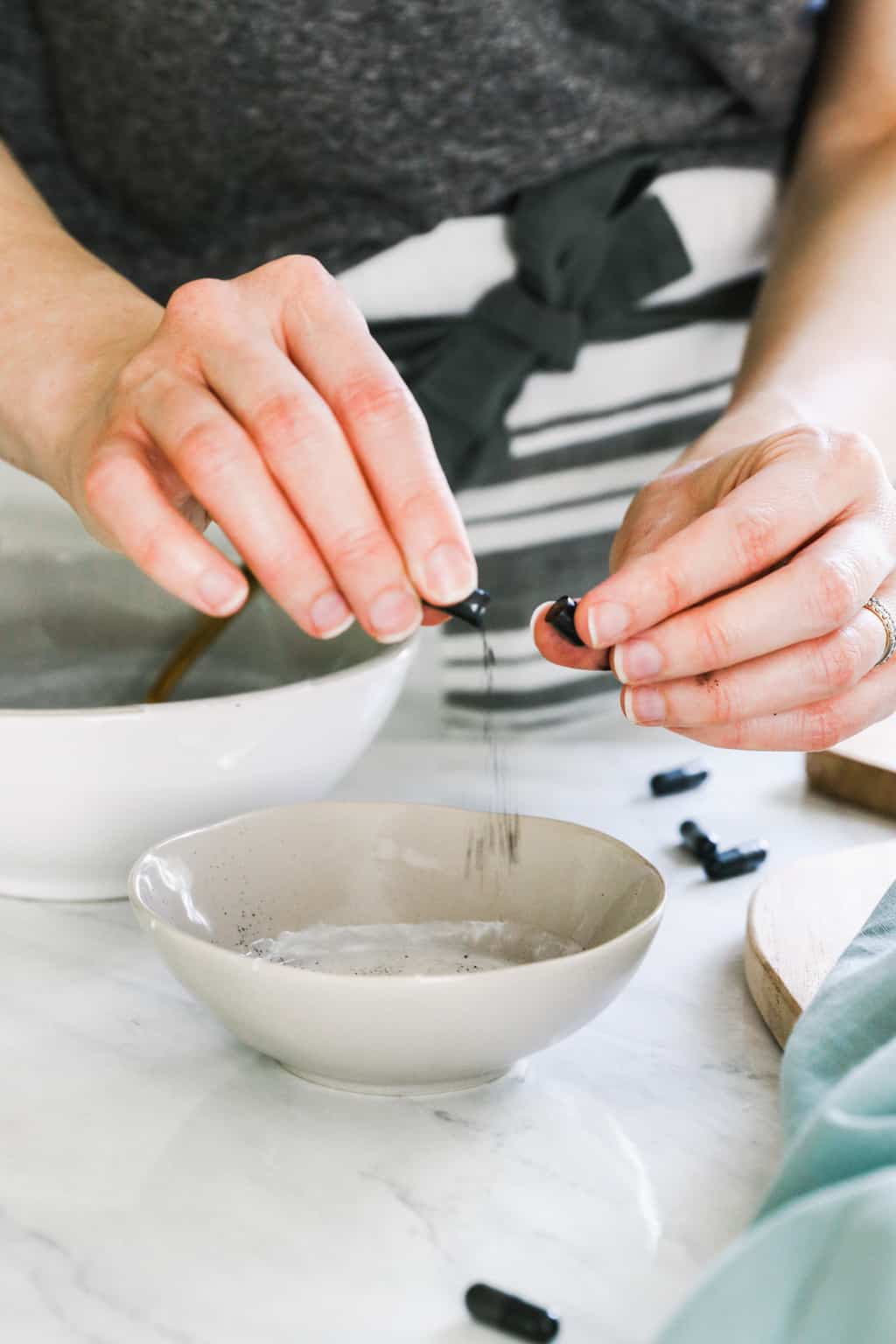
Step 2: Add charcoal
Remove a small amount of soap into a cup and let it cool slightly. Add the activated charcoal to the soap and blend until no lumps remain. Add it back to the rest of the melted soap and stir to blend the charcoal.
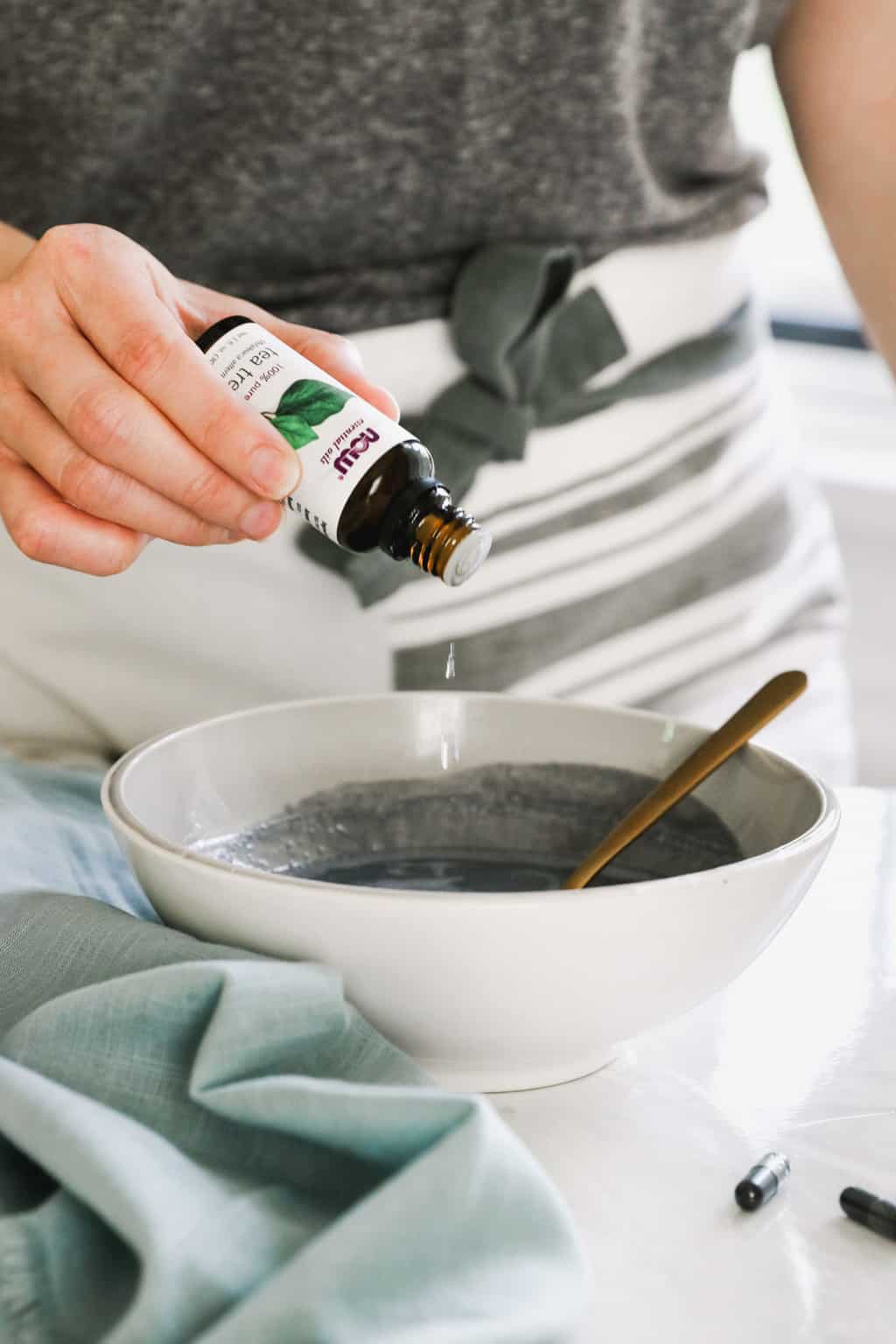
Step 3: Add essential oil
Add the tea tree oil. If you don't like the smell of tea tree, you can add peppermint essential oil to hide the scent.
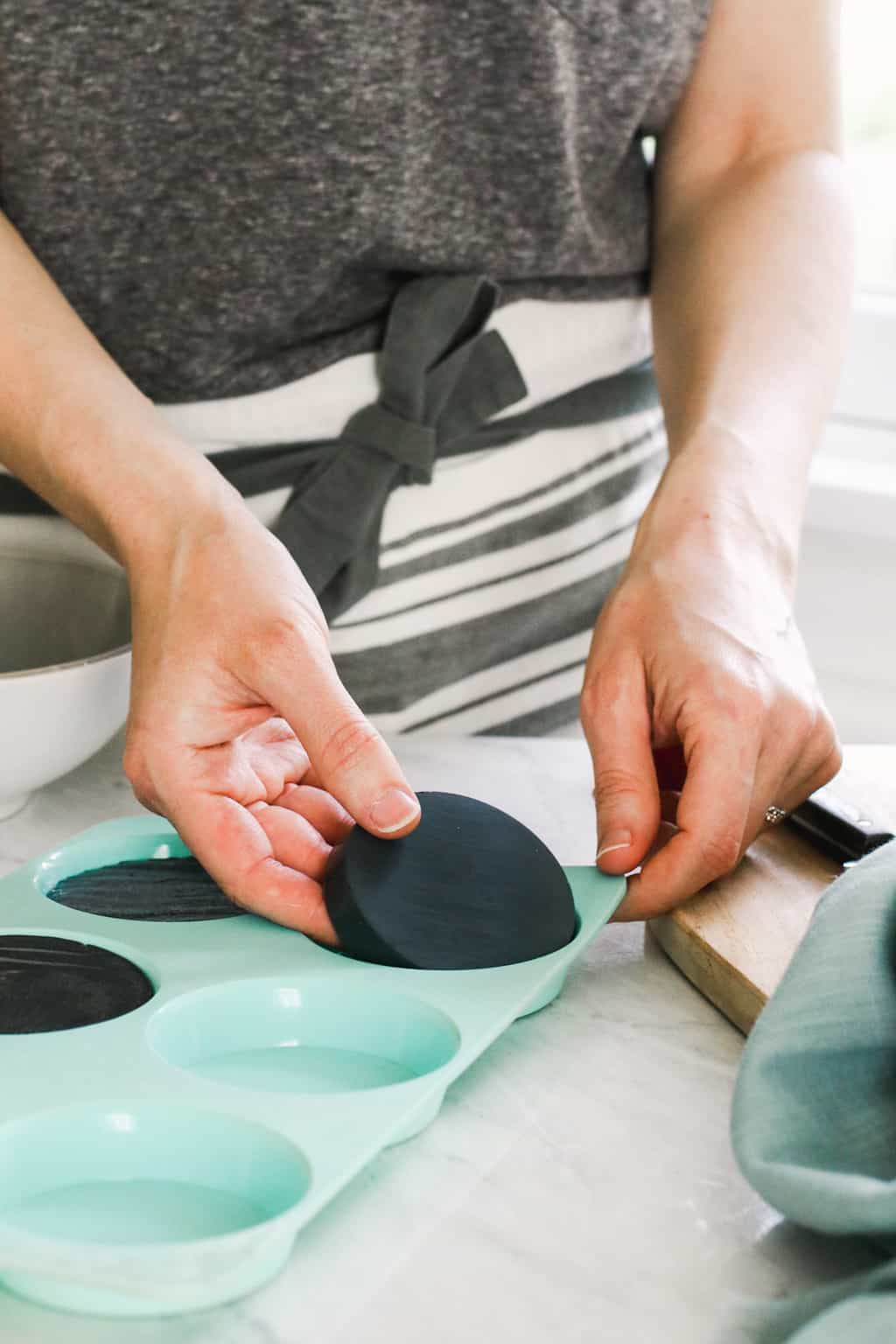
Step 4: Pour into molds + cool
Pour into a mold (silicone baking molds and muffin tins work well) and let cool completely before removing.
Troubleshooting
Making a mess: Yeah, activated charcoal can quickly get everywhere so go slow when opening up the charcoal capsules and try to avoid spills.
Prevent clumping: Adding charcoal to a small portion of soap helps it mix better. If you’re having problems with clumping, use a wire whisk to break them up.
Only when you’ve gotten rid of all clumps should you add it to the larger portion of the soap base.
Stuck soap: Feel free to lightly coat your muffin tin with nonstick spray if you’re worried about your soap sticking. Otherwise, just put the muffin tin in the freezer for 5–10 minutes, and they should pop right out.
Yield: If using a muffin tin like I did, this makes about 6 bars of soap. These soaps should last about 6 months.
Recipe Variations
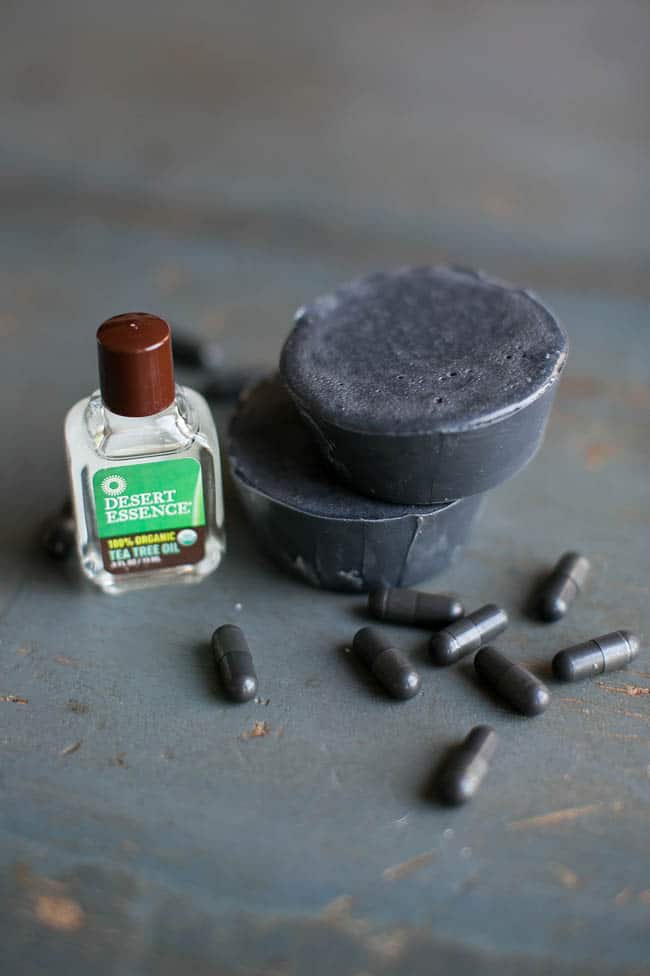
By varying the base soap, essential oils, and additional ingredients, you can create a wide range of personalized, effective, and delightful charcoal soaps tailored to different skin types and preferences.
1. Change the Base Soap
You can replace the shea butter soap base with another soap base of your choosing. Some good options include plain glycerin, olive oil, goat milk, honey, and oatmeal.
- Goat Milk Soap Base: Adds extra hydration and is great for sensitive skin.
- Olive Oil Soap Base: Provides a more luxurious lather and is moisturizing.
- Honey Soap Base: Adds natural antibacterial properties and extra moisture.
- Oatmeal Soap Base: Adds gentle exfoliation and soothes irritated skin.
Feel free to use whichever soap base you prefer! I have always used Our Earth’s Secrets soap base. They disclose their ingredients on the label and try to stay away from anything too harsh, so I feel confident using them on my skin.
If you’re wondering how to use melt-and-pour-soap or what kind of base to use when, check out our Complete Guide to Using Melt-and-Pour Soap.
2. Swap or Add Essential Oils
If you don't like the smell of tea tree oil, you can either mask it by adding peppermint oil to the mix or replace it with another antibacterial essential oil, such as lemongrass, eucalyptus, or orange oil [source].
- Lavender: Calming and great for reducing redness and inflammation.
- Lemongrass: Refreshing and has natural antibacterial properties.
- Eucalyptus: Adds a refreshing scent and has antiseptic properties.
- Peppermint: Cooling and invigorating, can help mask the tea tree scent.
- Rosemary: Stimulating and helps improve circulation.
3. Add Exfoliants
Turn your soap into an exfoliating bar by adding one of the following ingredients. Use a gentle option like oatmeal if you plan to use the soap as a facial cleanser.
- Ground Oatmeal: Adds gentle exfoliation.
- Coffee Grounds: For a stronger exfoliation and invigorating scent.
- Sea Salt: Adds a spa-like feel and detoxifies.
4. Add Moisturizers
For extra hydration, add 1–2 teaspoons of carrier oil per pound of soap base. Adding too much oil may affect the firmness and lather of the final bar so don't go overboard!
- Aloe Vera Gel: Soothes and hydrates skin.
- Honey: Adds moisture and antibacterial properties.
- Coconut Oil: Adds extra hydration and a tropical scent.
- Jojoba Oil: Mimics skin’s natural oils, great for acne-prone skin.
5. Create Combination Soaps
- Charcoal and Clay: Mix in bentonite clay for added detoxification.
- Charcoal and Aloe Vera: Combine with aloe vera for extra soothing properties.
- Charcoal and Citrus: Add orange or lemon essential oils for a refreshing, citrusy scent.
If you prefer a liquid soap, you can follow this recipe.
FAQ
No, the soap itself may create a gray-colored lather or leave a bit of residue in the tub, but it won’t stain. If you get any loose charcoal on your clothes while making the soap, rinse them immediately, and spritz with a bit of laundry spray. It should come right out in the wash.
No, you should use only food-grade activated charcoal for soap making. Charcoal meant for grilling or other purposes is not safe for skin and can contain harmful substances.
Yes, activated charcoal soap is gentle enough for the face and can help detoxify, unclog pores, and control oil. However, if you have sensitive skin, it’s a good idea to do a patch test first.
More Ways To Use Activated Charcoal
Want to try more ways to use activated charcoal? Here are some of our readers' favorite recipes:
DIY Detox Tea Tree + Charcoal Soap
Equipment
- Microwave-safe bowl or double boiler
- Soap mold
Materials
- ½ pound shea butter soap base or any kind you choose
- 5 activated charcoal capsules if you can't find at a pharmacy, you can buy online or use 1 teaspoon of powder
- 15–20 drops tea tree essential oil
Instructions
- Cut the soap base into small chunks and place in a microwave safe bowl. Heat in 30-second intervals until completely melted.
- Remove a small amount of soap into a cup and let cool slightly. Open the charcoal capsules, and mix charcoal into slightly cooled soap until blended and no lumps remain. Add back into the rest of the melted soap base and stir well to fully disperse charcoal.
- Add the tea tree oil. If you don't like the smell of tea tree, you can add peppermint essential oil to hide the scent.
- Pour into mold (I used a silicon mold I had lying around, but a muffin tin works great) and let cool completely before removing.
Notes
This post was medically reviewed by Dr. Jennifer Haley, a board-certified dermatologist with extensive experience in medical, cosmetic, and surgical dermatology. Learn more about Hello Glow’s medical reviewers here. As always, this is not personal medical advice, and we recommend that you talk with your doctor.
553
